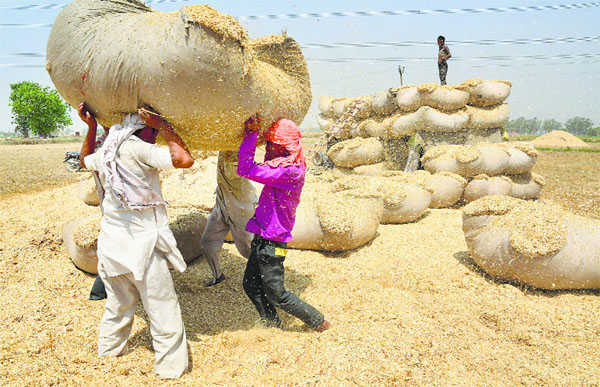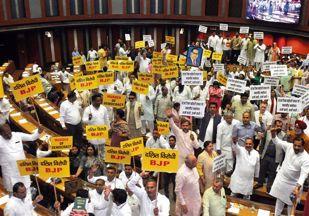
The Government of India has come out with the much-awaited Agricultural Produce and Livestock Contract farming (Promotion and Facilitation) Act, 2018. It is a model Act and it will depend on the states to adopt it primarily because agriculture is a state subject. State governments may introduce needed modifications as per the socio-economic peculiarities of the states and products involved.
For the success of the programme, there are some limitations and pitfalls that need to be taken care of. First and foremost issue is of the uniformity and amenability of the produce to grading and processing into quality products. In most of the cases the produce meant for processing is not of the same characteristics and quality as the one meant for table purposes. Examples are potatoes, tomatoes, oranges etc.
Potatoes for processing, for instance, must be low in sugar content. Most of the potato varieties available in the country are not suitable for processing because of higher sugar content. Oranges meant for processing should have higher juice content with thin and tight skin. For table purpose, oranges of loose skin are preferred by consumers.
If the produce is of the dual purpose quality, it may land the contractor in the problems of supply of raw material. Example of Pepsi Co, related to Tomato Processing Plant at Hazura (district Hoshiarpur) is before us. The company entered into contract with the farmers to purchase tomatoes at Rs 3 per kg. The company brought in technology of breaking hard pan of soil which doubled the productivity of tomatoes and advanced the harvest period for three weeks and also prolonged it for two weeks by producing nursery plants under nets on sterilised soils early in the season. However, early season prices in the market ruled high at Rs 14 per kg and even higher. The producers did not deliver tomatoes to the company.
Same situation developed in the end period. But during the flush season, prices dropped to Rs 2 per kg and even lower. There was pressure on the company to lift the produce. The company was handicapped because so many small and marginal farmers were involved and it was not possible to proceed against them legally. On the other side, farmers too did not have the wherewithal and a single entity to proceed against the company. Pepsi Co had to ultimately sell out the plant to the Brooke Bond Company.
In many cases the contractors did not honour the contracts because they were incurring losses in the deal and producers were left high and dry. It is, therefore, absolutely necessary that the contractor has a substantive stake in the deal and farmers' produce be largely suitable for processing only. The dual purpose produce puts the contractor at a disadvantage. Also it has to be realised that sustainable processing cannot be based on the produce surplus of consumption purposes available during the glut period only. For seasonal crops and perishable products, processing has to be multiproduct system.
Another business aspect is that the product prepared out of the produce must be of standard and uniform quality. Tea brands are an example. Throughout the year in all seasons and throughout the world, the brands carry the same quality in spite of the fact that the produce is purchased from different countries, many locations and is of different qualities and grades. Varying quality of the same product does not go well with consumers. One way to assure uniform quality of the product is to ensure the stake of the contractor in seed quality and production as well harvest technology adopted by the producers. For example, while working as project manager of an FAO project in Iran, a sugar factory was set up based in southern part of the country based on sugar beet production. In this case the factory management was made responsible for acquiring the mono-germ seed, its distribution among the producers and dispensing of production technology and harvesting methods as well as transport timings. All these costs were accounted for and adjusted in the payments to be made to the producers. The enterprise operated and is still operating to the advantage of both the factory and the producers without dispute.
Another example is of contract of sugar factory with small farmers in Hawaii Island. Here, the factory itself cultivates the sugarcane crop, harvests and takes it to the factory. The owner has the right to work or not on the farm as per his choice. The factory keeps all records of the costs involved and pays the balance of the proceeds to owners of the land. These contracts are long term because of the requirements of the processing factory.
Near at home is the example of the Maharashtra sugar mills that undertakes to buy sugarcane from the areas authorised by the factory. In this case the factories have harvesting squads and sugarcane is harvested as per the daily needs of the factories depending upon the season and cultivars grown as early, mid season and late maturing varieties. This ensures the least time lag between harvesting and processing which is one of the most important factors for higher sugar recovery in the state. Thus legal aspects apart, the economic interest of the contracting parties have to be fully intermeshed with substantive stakes of both the parties for the contracts to be successful.
— The writer is an economist and Chancellor, Central University of Punjab
Model Contract Farming Act
Purpose
The Act will provide adequate confidence to farmers and incentives to the sponsors to enter into a contract — Union Agriculture Minister Radha Mohan Singh
Background
- The Budget 2017-18 announced preparation of a Model Contract Farming Act and circulation of the same to states for its adoption
- May 22, 2018: The Centre released the Agricultural Produce and Livestock Contract Farming and Services (Promotion & Facilitation) Act 2018
- It is a promotional and facilitative Act and not regulatory in its structure
Features
- Protects the interests of farmers as they are weaker than the sponsors
- Besides contract farming, it also provides for services contract
- Provides for registering and agreement recording committee
- Contracted produce is covered under crop/livestock insurance
- Contract framing outside the ambit of APMC Act
- No permanent structure can be developed on farmers' land
- No right, title of interest of the land shall vest in the sponsor
- Farmer Producer Organisation (FPOs) can mobilise small/marginal farmers
- No rights, title ownership be transferred to the sponsor
- Ensures buying of entire pre-agreed quantity
- Contract Farming Facilitation Group to promote contract farming and services
- Accessible and simple dispute settlement mechanism at the lowest level
(Source: Ministry of Agriculture & Farmers Welfare)
Advantage and disadvantage
Good for farmers
- Inputs and production services are often supplied by the sponsor
- This is usually done on credit through advances from the sponsor
- Contract farming often introduces new technology/ new skills
- Price risk is reduced as many contracts specify prices in advance
- Contract farming opens up new markets to small farmers
Bad for farmers
- While growing new crops, farmers face risks of market failure and production problems
- Quotas are often manipulated so that not all contracted production is purchased
- Sponsoring companies may be unreliable or exploit a monopoly position
- The staff of sponsoring organisations may be corrupt
Good for sponsors
- Contract farming with small farmers is politically acceptable
- Working with small farmers overcomes land constraints
- Production is more reliable than open-market purchases
- More consistent quality can be obtained
Bad for sponsors
- Socio-cultural constraints may affect production as per specifications
- Poor management may lead to farmer discontent
- Farmers may sell outside the contract
- Farmers may divert inputs supplied on credit to other purposes
(Source: The Food and Agriculture Organisation)
Examples in northern states
Punjab
UB Breweries is executing contract farming in about 2,800 acres in Punjab for barley spread across several districts, including Bathinda, Ferozepur, Mansa, Muktsar and Barnala
Haryana
In 2011, Dharani Suphalam undertook contract farming for fruits and vegetables. Earlier, SABMiller India, the maker of Fosters, Castle lager and Haywards, had roped in 400 farmers across 2,500 acres for contract farming of malting barley in the arid regions such as Gurgaon, Jhajjar and Sirsa



























